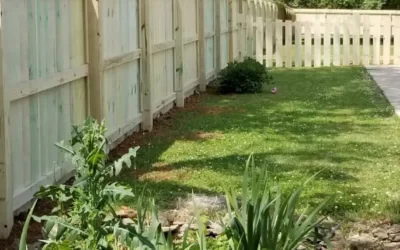Choosing the right ranch fencing material and style can help significantly reduce the loss of livestock by ensuring that cows, horses, hogs and other animals can’t jump over, dig under, or destroy a fence. The right farm fencing can also keep predators and unwanted visitors out. Take the time to familiarize yourself with fence types and livestock behavior before selecting your fence.
Benefits of Stockade Fencing for Raising Livestock
In addition to increasing a home or business’s value, stockade fences are simple to install, require little maintenance and adhere to county codes and regulations. Stockade fencing is recommended for confining chickens, turkeys, hogs and other small livestock.
Cedar is a popular wood used to make stockade fencing. However, with restrictions on harvesting older cedar trees, wood industries are starting to use more abundant tree species such as White fir and Douglas fir. Heartwood (the darker, inner section of tree trunks) can be harvested from these trees, and this wood outperforms cedar wood in exterior applications. This is because it contains less moisture than sapwood and is less vulnerable to fungal growth and decay.
Animal-Friendly Wire Fences
Wire fencing is called smooth fencing because it is not fortified with sharp barbs. An animal-friendly type of fencing that also helps deter trespassers, wire fences are frequently used to contain horses, cows, llamas, and other larger livestock that tend to walk or graze near fencing. Smooth wire fencing eliminates the risk of injury to livestock that may come in contact with the fencing, reduces the risk of entrapment or entanglement in the wire, and is strong enough to keep larger livestock contained. In addition, livestock owners can attach one barbed wire at the top of a smooth wire fence to help stop unwanted animals from entering a pasture or other contained area.
Wooden Ranch Rail Fencing for Larger Livestock
Wooden rail fencing has been used for hundreds of years by farmers and livestock owners and continues to be a favorite of both home and farm owners today. Wooden ranch rail fencing works well to contain horses, small herds of cows, and sheep. While vinyl ranch rail fencing is increasing in popularity, people often prefer the rustic, aesthetic quality wooden ranch fencing lends to their property. This type of fencing comes as three-rail or four-rail.
Treating a wooden ranch rail fence with copper naphthenate turns wood a distinctive shade of green that eventually weathers to beige or light brown. After a treated wooden fence weathers for a month or two and turns brown, you can then paint the fence without interfering with the copper naphthenate’s wood preservation properties.
Cattle Guards
Cattle guards eliminate the need for gates with latches and save time for farmers or ranchers who want to drive vehicles quickly onto pastures without getting out of their vehicle to lift latches, open gates, and then close gates. Made from square or round steel tubing, cattle guards can be equipped with wings, a removable box, a clean-out line, or an integral box. A flat cattle guard is inserted into a hole in the ground using cement forms. Alternatively, a boxed cattle guard isn’t inserted into the ground but lies on top of the ground and has gravel underneath to allow for good water drainage. In addition, boxed cattle guards form ramps on both sides of the guard so that vehicles can easily drive over them. Both flat and boxed cattle guards are equal in durability and strength.
More About Livestock Fencing
The type of fencing you choose for corralling livestock depends largely on the animal. For example, horses should be able to clearly see a fence to avoid becoming entangled in it. For this reason — along with the strength of the material — wooden ranch rail fencing is ideal for horses. Cattle should be contained by smooth wire fencing at least 55 inches tall and connected to treated wood posts. When bulls require separation from cows, consider a stronger fencing system, larger wire gauge, and thicker posts to stop them from attacking cows.
If you have hogs to contain, consider wire panels that are heavy gauge and resistant to collapsing when excited hogs run into them. High tensile, electrified wire fencing is gaining in popularity for reliable hog fences. Finally, all goat owners know how quickly goats learn the art of escaping just about any kind of fence. The best fencing to prevent goats from escaping is electrified net wire fencing firmly attached to commercially made posts.
For over 25 years, Grizzly Fence has provided home, ranch, business, and farm owners with superior fencing and 100% free estimates. Contact us today to learn more about our great fencing choices.



